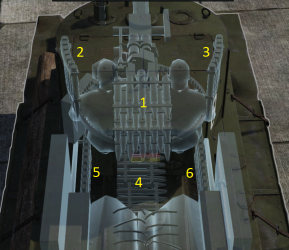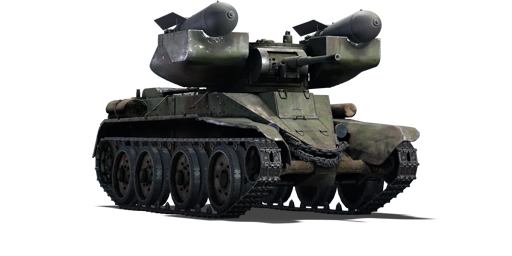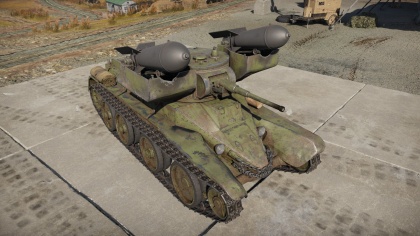RBT-5
Contents
Description
The RBT-5 is a gift rank Soviet light tank
with a battle rating of (AB), (RB), and (SB). It was available as a prize during the 2016 "Thunder League" eSports tournament as a giveaway prize for watching the Twitch stream, later every Dog-Tag owner who voted for Team Dislike earned one due to the "Champion" prize. It is currently available through the Gaijin store for individual sale or through the 'Project-X' trophy.
The RBT-5 is a regular BT-5 with the mounts to hold two 250 kg TT-250 torpedoes modified as rockets. The large calibre rockets prove hard to aim, but a real dealer to anything it hits.
This tank is quite unique. It has virtually no armour, weights only 11,5 tons and has a massive 400 HP engine (442 HP fully upgraded), giving it up to 38 HP/Ton ratio. This paired with excellent Christie suspension allows it to drive like a race car among tanks. Gun is an adequate 45mm 20-K cannon with decent penetration and quick reload.
Do remember - the RBT-5's two rockets are quite apart from each other, and that should be taken into account when aiming. The first rocket to be fired is the right one.
General info
Survivability and armour
Armour type:
- Rolled homogeneous armour
| Armour | Front | Sides | Rear | Roof |
|---|---|---|---|---|
| Hull | 13 mm (62°) Front glacis 20 mm (18°) Driver port 30 mm (62°) Lower glacis 40 mm (13°) Plate joint |
15 mm (1°) | 13 mm (0-59°) | 10 mm |
| Turret | 20 mm (11-43°) Gun mantlet 15 mm Turret front |
15 + 15 mm | 15 mm | 10 mm |
Notes
- Tracks and suspension wheel are both 15 mm thick.
- Rocket mounts provide additional spaced armour of 15 mm on the turret sides.
Mobility
| Game Mode | Max Speed (km/h) | Weight (tons) | Engine power (horsepower) | Power-to-weight ratio (hp/ton) | |||
|---|---|---|---|---|---|---|---|
| Forward | Reverse | Stock | Upgraded | Stock | Upgraded | ||
| Arcade | Expression error: Unexpected * operator. | 566 | Expression error: Unexpected round operator. | __.__ | |||
| Realistic | 323 | Expression error: Unexpected round operator. | __.__ | ||||
Armaments
Main armament
| 45 mm 20-K | |||||
|---|---|---|---|---|---|
| Capacity | Vertical guidance |
Horizontal guidance |
Stabilizer | ||
| 86 | -8°/+25° | ±180° | N/A | ||
| Turret rotation speed (°/s) | |||||
| Mode | Stock | Upgraded | Prior + Full crew | Prior + Expert qualif. | Prior + Ace qualif. |
| Arcade | 9.50 | 13.20 | _.__ | _.__ | _.__ |
| Realistic | 9.50 | 11.20 | _.__ | _.__ | _.__ |
| Reloading rate (seconds) | |||||
| Stock | Prior + Full crew | Prior + Expert qualif. | Prior + Ace qualif. | ||
| 3.80 | _.__ | _.__ | _.__ | ||
Ammunition
| Penetration statistics | |||||||
|---|---|---|---|---|---|---|---|
| Ammunition | Type of warhead |
Penetration in mm @ 90° | |||||
| 10m | 100m | 500m | 1000m | 1500m | 2000m | ||
| BR-240 | APHEBC | 69 | 68 | 59 | 50 | 42 | 35 |
| BR-240SP | AP | 73 | 71 | 62 | 52 | 44 | 37 |
| Shell details | ||||||||||
|---|---|---|---|---|---|---|---|---|---|---|
| Ammunition | Type of warhead |
Velocity in m/s |
Projectile Mass in kg |
Fuse delay
in m: |
Fuse sensitivity
in mm: |
Explosive Mass in g (TNT equivalent): |
Normalization At 30° from horizontal: |
Ricochet: | ||
| 0% | 50% | 100% | ||||||||
| BR-240 | APHEBC | 760 | 1.4 | 1.2 | 15 | 32.3 | +4° | 48° | 63° | 71° |
| BR-240SP | AP | 757 | 1.4 | N/A | N/A | N/A | -1° | 47° | 60° | 65° |
Ammo racks

| Full ammo |
1st rack empty |
2nd rack empty |
3rd rack empty |
4th rack empty |
5th rack empty |
6th rack empty |
Visual discrepancy |
|---|---|---|---|---|---|---|---|
| 86 | 72 (+14) | 57 (+29) | 43 (+43) | 29 (+57) | 15 (+71) | 1 (+85) | No |
Turret empty: 29 (+57)
Additional armament
| 420 mm TT-250 tank torpedo | |||||
|---|---|---|---|---|---|
| Capacity | Vertical guidance |
Flight speed (m/s) |
Range (m) | ||
| 2 | +9°/+50° | 260 | 6,500 | ||
Machine guns
| 7.62 mm DT | ||||||
|---|---|---|---|---|---|---|
| Coaxial mount | ||||||
| Capacity (Belt capacity) | Fire rate (shots/minute) |
Vertical guidance |
Horizontal guidance | |||
| 1,890 (63) | 600 | N/A | N/A | |||
Usage in battles
Best tactics is probably however to not charge right into the combat, but wait a while how the battle develops - observe where and how many enemy tanks go, maybe fire a few shots from the distance. Use your great mobility to get to the best positions. And then use its awesome speed to charge at lonely opponents, which at close range have no chance of keeping their guns pointed at you. Keep in mind that charging into more than 1 opponent is usually a quick end, as it is very hard to not get hit from either of them at the same time. There is no armour on BT-5 to stop anything other than machinegun fire. Finally, try to avoid AA vehicles, as they will have no problem targeting and destroying you, even from the distance.
Pros and cons
Pros:
- 45mm 20-K gun offers great penetration
- 20-K gun offers a good rate of fire
- The BR-240 APHEBC rounds deals the best damage and spalling at its rank, allowing for impressive post-penetration damage
- One of the fastest tanks in the game, the best acceleration and overall mobility
- Front armour, although very thin, may bounce shells thanks to the decent sloping of the glacis
- Sometimes used in high rank matches as scout/distraction/intruder - spawning does not account to a total of 3 spawns
- Excellent turning radius, allows the vehicle exploit enemy vehicles' turret traverse speed
- Very powerful rockets, can even instantly destroy a Maus, allowing the RBT-5 to handle even formidable foes
Cons:
- Equipped with only 2 rockets
- Rockets are set at a fixed angle which further complicates aiming, does not allow for zeroing targets
- Armour can only cope with rifle caliber rounds, could also deflect a few heavy machine gun rounds
- Very vulnerable to quick-firing automatic cannons like the German 20mm cannons or the TShN
- Terrible crew arrangement, a well-placed, penetrating shot will automatically take out the crew
- Rockets may overshoot at close range, due to the affixed nature of the mounting
History
Development
The BT, or Bystrokhodny tank, was the forerunner to the T-34. The tank's name translates to "high-speed tank" and it lived up to that expectation. The BT series of tank's origin lays with an American Racing enthusiast named Walter Christie, also a prolific automotive designer. When the U.S. Army Ordnance Bureau repeatedly declined to produce Christie's designs, he becomes so frustrated with them for turning their interests away from a tracked vehicle able to go 60 miles per hour, so he turned to other countries such as Great Britain, Poland, and the Soviet Union. The Soviet's were eager to purchase his designs and were able to receive two M1931 turret-less examples that were labeled as "agricultural tractors", as well as the license to build more of their own variants. The Soviets quickly produced working prototypes of Christie's tanks and made various changes and improvements at the KhPZ factory in Kharkov. The development of the Christie suspension on the tank would become the BT-2 light tank. Further development would improve the BT-2 design as the BT-5, released sometime in 1935.
Design
The Christie design was based on the concept of "convertible tanks" which was to reduce the wear of tank tracks as they were quite unreliable at the time. The tracks could be removed and instead the vehicle would run on a chain drive to allow the tank to reach high-speed on roads with just the wheels that could be steered by pivoting the front road wheels. The conversion took about 30 minutes to complete. The Soviets saw the "convertible tank" feature of the Christie design to be of little use due to the lack of paved road in the Soviet Union, which was necessary for the use of the wheel conversion. The conversion also added unnecessary complexity and weight, so this was removed from later Soviet tank designs.
The primary changes from the BT-2 to the BT-5 was its new larger cylindrical shaped turret and more powerful 45 mm 20-K cannon. The new turret was capable of housing radio equipment and gave crew more freedom to move around. The BT-5 was slightly heavier then the BT-2, but the armour was left unchanged. The 12 cylinder M5 power-plant that was based off an American Liberty aircraft engine that was adapted for use with the BT series. It allowed the tank to travel up to impressive speeds. Several variants of the BT-5 were constructed that included features such as flamethrowers, 76.2mm cannon, and a snorkel to aid in fording waterways. Projects in extending the BT's role in other jobs also took place, such as the RBT-5, which is a rocket launcher artillery variant that mounts two large 420 mm tank torpedoes on the turret, but this did not past prototypes. During its development, it was also slowly replaced by the improved BT-7 model being produced form 1935 onward. A reported 1,884 BT-5 light tanks were produced from 1932 to 1941.
Combat usage
The BT tanks were meant to be a cavalry tank, and at the time of their introduction they were considered some of the finest tanks against other countries' tanks. They had great mobility of all available tanks, and its 45 mm gun could perform very well in combat. The only drawbacks of the design was its light armour and its gasoline engine, which caused the design to be rather flammable to improvised incendiary weapons. The BT-5's most notable combat service came against the Japanese at Khalkhin Gol. The tactics of Soviet Marshal Georgi Zhukov and the performance of his BT-5 and BT-7 tanks led to a decisive victory. It was during this battle that the BT tendency to catch fire was found, but its performance was positive against the inferior Japanese armoured forces.
During the Spanish civil war, a force of BT-5s fought with the Republican forces and performed quite well against its inferior German and Italian opponents, whom deployed lightly armoured tanks with machine guns as their armament. With the outbreak of World War II, the BT-5 was deployed against Poland and aided in the defense of Russia from the invading German army in Operation Barbarossa, though was of little use against the better German Panzer IIIs and Panzer IVs. The BT-5 saw service through to the end of the war, where it participated alongside BT-7s and more modern Soviet tanks against Japanese-controlled Manchuria in August 1945.
Media
Skins and camouflages for the BT-5 mod. 1933 from live.warthunder
"RBT-5 Unique Premium Test drive!"
by B.F.B Reptile ITA
See also
Links to the articles on the War Thunder Wiki that you think will be useful for the reader, for example:
- reference to the series of the vehicles;
- links to approximate analogues of other nations and research trees.
External links
| USSR light tanks | |
|---|---|
| T-26 | T-26 · T-26 (1st Gv.T.Br.) · T-26-4 · T-26E |
| BT | BT-5 · RBT-5 · BT-7 · BT-7 TD · BT-7M · BT-7A (F-32) |
| T-50 | T-126 · T-50 |
| T-70 | T-70 · T-80 |
| PT-76 | PT-76B · PT-76-57 · Object 906 |
| BMP | BMP-1 · BMP-2 · BMP-2M · BMP-3 |
| BMD | BMD-4 |
| 2S25 | 2S25 · 2S25M |
| Wheeled | BA-11 · BTR-80A |
| Other | T-60 · Object 685 · 2S38 |
| China | ▂Type 62 |
| USSR premium ground vehicles | |
|---|---|
| Light tanks | BA-11 · RBT-5 · BT-7A (F-32) · T-26 (1st Gv.T.Br.) · T-26E · T-126 · PT-76-57 · 2S38 |
| Medium tanks | T-34 (Prototype) · T-34 (1st Gv.T.Br.) · T-34E · T-34-57 (1943) · T-34-85E · T-34-100 · T-44-122 · TO-55 · T-55AM-1 · T-72AV (TURMS-T) · T-80UD · Т-80U-Е1 |
| ▂M3 Medium · ▂M4A2 · ▂T-III · ▂T-V · ▂МК-IX "Valentine" | |
| Heavy tanks | SMK · T-35 · ▂MK-II "Matilda" · KV-1E · KV-2 (1940) · KV-2 (ZiS-6) · KV-122 · KV-220 · IS-2 "Revenge" · Object 248 · IS-6 · T-10A |
| Tank destroyers | BM-8-24 · BM-13N · BM-31-12 |
| SU-57 · SU-76D · SU-76M (5th Gv.Kav.Corps) · SU-85A · SU-100Y · SU-122P · Object 120 | |
| SPAA | ▂Phòng không T-34 · ZUT-37 |





